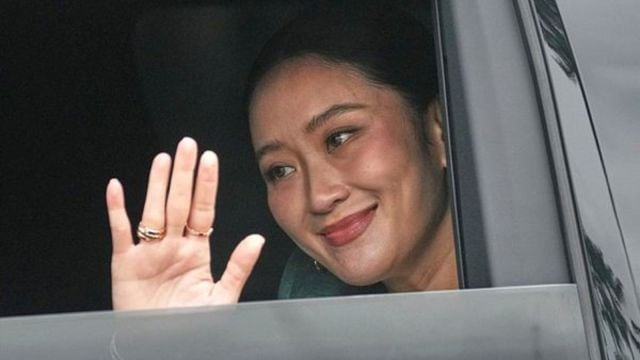Thailand’s Constitutional Court ordered Prime Minister Paetongtarn Shinawatra’s suspension from office pending an investigation.
New Delhi | Updated: July 2, 2025 05:36 IST

Thailand’s political and diplomatic landscape was thrown into turmoil on Tuesday when Prime Minister Paetongtarn Shinawatra was suspended by the country’s Constitutional Court. The decision came amid an ethics probe triggered by a leaked phone call with Cambodian Senate President Hun Sen, following a deadly border skirmish.
Thailand’s Constitutional Court ordered Prime Minister Paetongtarn Shinawatra’s suspension from office pending an investigation into whether she violated ethical standards during a phone conversation with Hun Sen.
What was in the leaked phone call?
The call, made on June 15, came weeks after a border clash between Thai and Cambodian forces on May 28, which left one Cambodian soldier dead.
The leak of the call caused a political firestorm in Thailand, with critics accusing Paetongtarn of compromising national interests and undermining military authority. The call was recorded by Hun Sen and later leaked. Hun Sen claimed he had shared the recorded conversation with more than 80 people.
In the conversation, Paetongtarn and Hun Sen were heard discussing how to resolve Thailand-Cambodia border tensions and whether to ease restrictions imposed after the clash. According to multiple reports, Paetongtarn referred to Hun Sen as “uncle” in the phone call. Hun Sen is a close friend of Paetongtarn’s father, Thaksin Shinawatra, who too was a Prime Minister of Thailand.
She reportedly urged Hun Sen not to listen to “the other side” in Thailand and singled out an outspoken Thai army commander who had criticized Cambodia. In the leaked phone call, Paetongtarn is also heard labelling the army commander as “an opponent.”
Paetongtarn reportedly did not stop at that. Referring to the army commander, she said he “just wants to look cool”. She also told Hun Sen to let her know what he wanted, promising to try to manage that, the AP reported.
The remarks were seen by critics as excessively conciliatory, potentially damaging Thailand’s diplomatic and military posture. Though Paetongtarn apologised, she defended her words as part of a negotiating strategy, denying any harm to national interests, an AP report said.
Escalation in Thailand-Cambodia dispute and a controversial map
The conflict stems from a brief firefight on May 28 in a disputed area along the Thai-Cambodian border. Both sides blamed each other and claimed self-defense. The incident reignited long-standing territorial tensions, though both governments later expressed intent to de-escalate.
Despite this, retaliatory actions continued. Thailand imposed severe border restrictions, allowing only limited crossings for essential needs, Cambodia responded by banning Thai media, halting fruit and vegetable imports, and boycotting Thai electricity and internet connections. The country also suspended fuel imports from Thailand.
Thailand and Cambodia share over 800 km of land border, but parts remain unmarked or contested. Much of the disagreement traces back to a 1907 map drawn under French colonial rule, which Cambodia uses to assert its claims. Thailand disputes the map’s accuracy.
In February, tensions flared when Cambodian troops entered a disputed temple area and sang their national anthem, provoking Thai soldiers. Historically, the most violent clashes occurred around the Preah Vihear temple, a 1,000-year-old site claimed by both nations.
In 1962, the International Court of Justice (ICJ) ruled in Cambodia’s favour regarding the temple. After deadly clashes in 2011, the ICJ reaffirmed Cambodia’s sovereignty over the area in 2013—a decision that remains contentious in Thailand.
What’s new in Thailand-Cambodia tensions
Cambodia has submitted the latest border issue to the ICJ, seeking a legal resolution for multiple contested areas, including the site of the May 28 clash. Thailand, however, has rejected ICJ jurisdiction, favouring resolution through a bilateral mechanism established in 2000—a joint committee responsible for land demarcation.
Cambodia insists it will no longer engage through bilateral discussions, escalating the standoff. Nationalistic rhetoric has surged on both sides, further complicating diplomacy.
The friction between Thailand and Cambodia is not just about overlapping border claims. Deep-seated cultural enmity between the two countries dates back centuries, when they were large and competing empires. In more recent times, bad feelings have lingered as Cambodia’s development, hindered by French colonialism and, in the 1970s, the brutal rule of the communist Khmer Rouge, has fallen well behind Thailand.
Both countries have fought over claims to cultural products ranging from boxing and mask dancing to traditional clothing and food.

1 comment:
Only Hun Sen "TVEU BARN". Hun Sen is a heartless one eyed monster.
Post a Comment